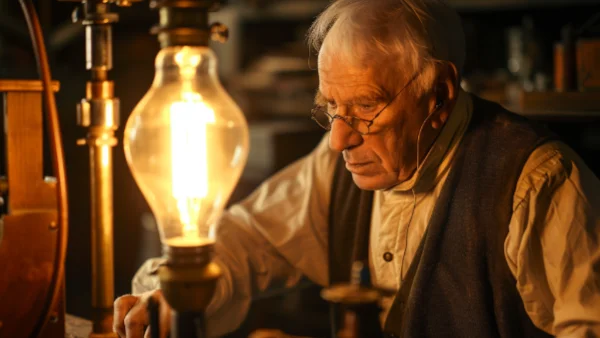
> Feeling burnt out? Subscribe to my Everyday Self-Care Newsletter for self-care tips and doable habits that support your well-being.
Nobody likes to fail. It feels like a step back, a moment where everything you’ve worked for just doesn’t pan out. But what if these moments aren’t just about disappointment? What if they’re hidden opportunities to learn something valuable? This might be a bit hard to believe, but failure comes with its own set of benefits.
This article talks about how failing isn’t the end of the world. In fact, it’s an important part of growing and moving forward. Through failure, you can learn resilience, unlock creativity, and even figure out what really matters to you. It teaches you to be empathetic towards others, to take risks, and to see things from new perspectives.
So, as you read through, think about your own experiences with not getting it right the first time. You might start to see these moments in a new light. Instead of seeing them as setbacks, you might see them as valuable lessons that help you become better at what you do and more understanding of those around you. Failure isn’t just about losing; it’s about finding new ways to win.
1. Resilience Building: How Failure Strengthens Your Emotional Fortitude
When you face failure, it can feel like a tough moment. But, believe it or not, these moments are actually good for you in a big way. They help you become more resilient. Think of resilience as your emotional muscle that gets stronger every time you have to deal with a setback or a letdown.
So, how does failing make you more resilient? First, it shows you that you can get through tough times. You learn to pick yourself up after something doesn’t go your way. This is really important because life is full of ups and downs. The more you go through, the better you get at bouncing back.
Also, dealing with failure teaches you a lot about patience and persistence. Not everything works out the first time, and that’s okay. You learn to keep trying, to adjust your approach, and not to give up easily. This kind of persistence is a key part of being resilient.
Another point is that failure takes away the fear of trying new things. Once you’ve faced a few setbacks, you start to worry less about what might go wrong. You know you can handle it, and this makes you braver in going after what you want.
In short, every time things don’t go as planned, you’re not just facing a setback. You’re getting a chance to build up your resilience. This means you’re becoming stronger emotionally, more persistent, and less afraid to take risks. All of these are crucial for navigating through life successfully.
2. Creativity and Innovation: Finding New Paths Through Setbacks
Failing isn’t just about stumbling; it’s a chance to get creative and find new ways to do things. When something doesn’t work out, it forces you to look at the problem from different angles. You start thinking outside the box because the usual ways didn’t deliver the results you hoped for.
This process of searching for alternative solutions fuels innovation. You come up with ideas that might never have crossed your mind if everything had gone smoothly. It’s like when you hit a roadblock, and instead of giving up, you find a new, perhaps even better route that you hadn’t considered before.
Moreover, failure teaches you that there are many ways to solve a problem. It opens up a world of possibilities that you might not explore otherwise. This can lead to breakthroughs and discoveries, both in your personal projects and in more significant, world-changing innovations.
So, the next time you face a setback, try to see it as an opportunity to flex your creative muscles. It’s a chance to experiment, to learn, and to discover new solutions that can lead you to unexpected and exciting places. Failure might just be the push you need to think differently and innovate.
3. Learning and Growth: The Educational Power of Failing
Every time you fail, you learn something new. It’s like getting a lesson you didn’t sign up for, but it turns out to be exactly what you need. Failure is not just about making mistakes; it’s about discovering what doesn’t work and why. This process is invaluable because it teaches you lessons you can’t get any other way.
Think of failing as feedback. It tells you where you need to improve, which areas to focus on, and what to do differently next time. This kind of learning is hands-on and sticks with you because you’ve lived through it. You’re not just memorizing facts; you’re understanding concepts through experience.
Also, failing makes you more adaptable. You learn to adjust your strategies, try new approaches, and stay flexible in the face of challenges. This adaptability is crucial in both personal growth and success in any field.
Lastly, the experience of failing and then pushing forward builds knowledge and skills that last a lifetime. It teaches you persistence, problem-solving, and the importance of continuous learning. So, while failing might feel like a step back, it’s actually setting you up for bigger leaps forward. It’s all part of growing and getting better at what you do.
4. Empathy and Compassion: Understanding Others Through Our Own Struggles
Going through tough times, especially when things don’t go as planned, teaches you a lot about empathy and compassion. When you experience failure, you know firsthand how hard it can be to face setbacks and the emotions that come with them. This understanding makes you more likely to feel for others when they’re going through their own tough times.
Having been there yourself, you can genuinely understand their feelings and what they’re going through. This doesn’t just make you a more caring friend or colleague; it makes you a more compassionate person in general. You’re more likely to listen, offer support, and help others because you know what it’s like to be in their shoes.
Also, experiencing failure and overcoming it teaches you not to judge others too harshly. You realize that everyone has their own battles and that sometimes, despite our best efforts, things don’t work out. This realization fosters a kinder, more understanding approach to the people around you.
In short, the struggles you face can open your heart to the struggles of others. This connection through shared experiences builds stronger, more empathetic relationships, reminding you that tough times can lead to greater understanding and kindness towards others.
5. Risk-Taking and Courage: The Role of Failure in Overcoming Fear
Facing failure has a big role in teaching you about taking risks and finding your courage. When things don’t go as planned, it’s natural to feel scared of trying again. But going through these moments shows you that failing isn’t the end of the world. It’s a step towards learning and getting better.
Every time you decide to try again despite a setback, you’re taking a risk. And with each risk, you learn that the fear of failing isn’t as powerful as you thought. You start to see that what really matters is giving it your best shot, not whether you fail or succeed every single time.
This process helps you become braver. You’re more likely to step out of your comfort zone and try new things because you know that failure isn’t something to be afraid of. Instead, it’s an opportunity to grow and learn. This kind of courage is invaluable, not just in personal pursuits but in every aspect of life.
So, remember, each time you face a setback and choose to keep going, you’re not just overcoming that specific failure. You’re also knocking down the walls of fear that hold many people back. This courage to keep moving forward, to keep taking risks, is one of the most valuable lessons failure can teach you.
6. Refining Goals and Priorities: How Missteps Clarify What Matters Most
When things don’t go as planned, it can actually help you see what’s truly important to you. Sometimes, you might chase a goal only to find out after failing that it wasn’t what you really wanted. Failures like these aren’t just setbacks; they’re opportunities to think about what you really value and what you want to achieve.
This process of reflection helps you fine-tune your goals and priorities. It’s like clearing away the clutter to see the few items that really matter. You might realize that some of your goals weren’t that important after all, and this can be a relief. It frees up your energy to focus on what truly excites you and aligns with your values.
Also, through these missteps, you learn to set more realistic and meaningful goals. Instead of aiming for what you think you should want, you start aiming for what you truly desire. This shift can make a big difference in how you approach your goals and how fulfilled you feel when you achieve them.
So, while failing might seem like moving backward, it’s actually helping you move forward in the right direction. It’s about refining your vision for your life, making sure your goals and priorities reflect what matters most to you. This clarity is priceless because it guides your decisions and actions towards a more fulfilling life.
7. Refining Goals and Priorities: How Missteps Clarify What Matters Most
Sometimes, not getting what you aimed for can be a blessing in disguise. It gives you a chance to stop and think about what you’re really after. Every setback or misstep is a moment to ask yourself: Is this goal truly important to me? Often, you might find that failure helps you see your true priorities more clearly.
Reflecting on these moments can lead you to adjust your goals. You might discover that what you thought you wanted isn’t what you truly value. This realization can lift a weight off your shoulders, allowing you to focus on goals that genuinely resonate with you.
Missteps also teach you about setting goals that are not just ambitious but also meaningful. You learn to aim for achievements that align with your personal values and bring you real joy, rather than chasing after what you think you should want based on others’ expectations.
In this way, going through tough times helps you fine-tune your direction in life. It sharpens your focus on what truly matters to you, guiding your future actions and decisions. This kind of clarity is invaluable, as it ensures that you’re not just busy, but meaningfully engaged in pursuits that are truly important to you.
Conclusion
Through this article, we’ve seen how failure isn’t just a roadblock but a powerful tool for growth and learning. It’s natural to feel down when things don’t go as planned, but these moments can actually be the best teachers. They show us where we need to improve, push us to find new solutions, and help us understand what really matters.
Turning failure into a stepping stone for success means looking beyond the immediate setback. It’s about asking yourself what you can learn from this experience and how you can use that knowledge to move forwards after failure and do better next time. This mindset shift doesn’t happen overnight, but with practice, you start to see challenges as opportunities.
Remember, every successful person has faced failure at some point. What sets them apart is their willingness to use these experiences to their advantage. They don’t let fear of failure stop them from trying again. Instead, they learn, adapt, and persist.
So, the next time you face a setback, try to see it as an opportunity. It’s a chance to grow, to refine your approach, and to move closer to your goals. With each failure, you’re not moving away from success; you’re taking another step towards it.


